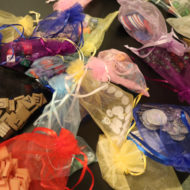We are excited that you are joining us this year to share your work with the community. These guidelines are designed to make the day flow smoothly. For any other needs or questions, please contact us at contactcunygames@gmail.com.
When and where am I giving my presentation?
All presentations (papers, panels), arcade demos, and posters will be listed in the printed and online schedule.
How long is my presentation?
There are 5 types of presentations at the CUNY Games Conference:
- 15 minute talk (with 5 minutes for Q&A)
- 50 minute panel presentation (with 10 minutes for Q&A)
- Poster during lunchtime Wednesday and/or Thursday
- Game demo during lunchtime Wednesday and/or Thursday
- Playtest Friday (anytime!)
When do I should show up for my time slot?
It would be best to meet 10 minutes before your scheduled time. If you have special audio-visual needs, please see below. We will not be able to support last minute audio-visual needs.
What audio-visual equipment is available in the presentation rooms?
Each presentation room is equipped with a presenter PC with internet access and speakers, a projector, and a screen. If you would like to bring your own laptop you will also need to bring any special adapters (e.g. Mac dongles).
What should I do after my presentation?
Please collect your personal belongings and poster/demo materials. Please leave any provided materials behind.
For my arcade demo, I have a room-scale virtual reality setup and a booth display with a fire breathing, robotic dinosaur that shoots bees out of its mouth. Where do I set up?
We may be able to accommodate a limited number of special displays. However, please contact us after your talk is accepted to make sure we have the space.
Posters/Game Demos
- On the day of the conference you will receive one table from which to present your demo and/or poster. You are welcome to use your table space however you see fit.
- Please note that tri-folds will not be provided for posters; please plan accordingly. Contact us with any questions or concerns.
- During each session attendees will walk around the room visiting each poster or demo at their leisure. Please plan to discuss your topic many times over the course of the session.
- While we’d like you to stay with your poster or demo for the majority of the session, you are also free to leave your table to see the other posters/demos.
- Outlets: There are a couple of outlets available in the poster/demo rooms, but not enough for everyone. If using your laptop or another electronic source for your demo, please make sure it is fully charged before the session.
Tips for Creating Effective Posters
Description
Although it is general practice to attend to your posters during a conference, the best posters are self-contained and self-explanatory. Observers should be able to understand your poster if you are not present.
Unlike traditional oral presentations, posters allow presenters to engage in intimate conversations with observers. Posters also allow observers to lead the pace of the discussion rather the presenter.
Good posters have enough text to tell the story, but not so much text that it alienates the observer. Figures are often more effective in facilitating a discussion compared to large blocks of text.
Organization
Posters for the CUNY Games Conference are 48 inches wide and 36 inches high. To conserve materials, we recommend and can provide a template for posters that are 42” x 31.5”.
Because you might have several observers trying to view your poster at once, it is best to organize the information in columns from left to right. This way, observers won’t have to cross in front of each other while reading.
The templates provided have four columns. Group logically consistent sections into columns using muted background colors or shades of gray. Poster ink is extremely expensive so, avoid dark backgrounds or patterns. Avoid printing on high gloss paper as well to reduce the time and cost of printing. Most poster printers will print a single sheet that can be transported using a poster tube.
Title
Provide the title, a list of authors, the author affiliations, and the presentation number of your poster (if applicable) using lettering that measures at least one-inch high.
Figures
Because observers will be viewing your poster from a distance, figures and text should be legible from 5 feet. Use high contrast colors on muted backgrounds and avoid red-green color combinations, which are difficult for the color blind to read.
Figures should be designed to convey one major point, but they may also include levels of detail for those interested in learning more than the highlights. Include figures for all relevant aspects of the research, but avoid unnecessary figures that convey little or redundant information.
Text
Each major section, figure, or table should be labeled with a brief heading that either describes a major section (e.g., “Methods”) or the overall message of the section (e.g., “Figure 1: Caffeine intake affects reaction times”).
The body of the text should use large type that is viewable from 5 feet. Paragraphs should be aligned to the left and unjustified (ragged right margins). Judicious use of numbered or bulleted lists makes the poster easy to read and insures that major sections are succinct.
On the day of the presentation
Arrive to the poster session at least 15 minutes before your designated time slot to be sure you have enough time to assemble the poster. Leave the posters up for the duration of your assigned time slot. It is your responsibility to provide poster boards, push pins, or binder clips to secure your poster.



